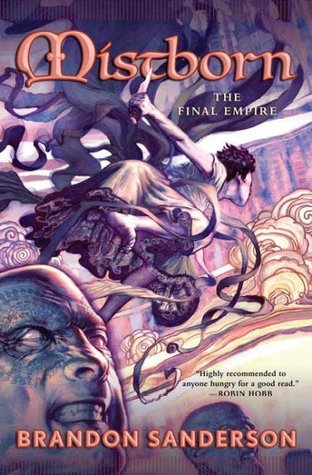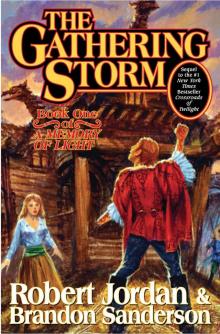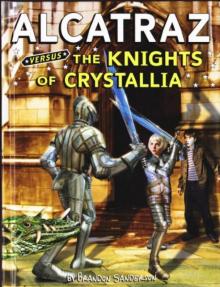- Home
- Brandon Sanderson
Edgedancer Page 6
Edgedancer Read online
Page 6
3
“Tallew, you say?” Hauka asked, holding up the tarp covering the suspicious pile of grain. “From Azir?”
“Yes, of course, officer.” The man sitting on the front of the wagon squirmed. “Just a humble farmer.”
With no calluses, Hauka thought. A humble farmer who can afford fine Liaforan boots and a silk belt. Hauka took her spear and started shoving it into the grain, blunt end first. She didn’t run across any contraband, or any refugees, hidden in the grain. So that was a first.
“I need to get your papers notarized,” she said. “Pull your cart over to the side here.”
The man grumbled but obeyed, turning his cart and starting to back the chull into the spot beside the guard post. It was one of the only buildings erected here above the city, along with a few towers spaced where they could lob arrows at anyone trying to use the ramps or set up position to siege.
The farmer with the wagon backed his cart in very, very carefully—as they were near the ledge overlooking the city. Immigrant quarter. Rich people didn’t enter here, only the ones without papers. Or the ones who hoped to avoid scrutiny.
Hauka rolled up the man’s credentials and walked past the guard post. Scents wafted out of that; lunch was being set up, which meant the people in line had an even longer wait ahead of them. An old scribe sat in a seat near the front of the guard post. Nissiqqan liked to be out in the sun.
Hauka bowed to him; Nissiqqan was the deputy scribe of immigration on duty for today. The older man was wrapped head-to-toe in a yellow shiqua, though he’d pulled the face portion down to expose a furrowed face with a cleft chin. They were in home lands, and the need to cover up before Nun Raylisi—the enemy of their god—was minimal. Tashi supposedly protected them here.
Hauka herself wore a breastplate, cap, trousers, and a cloak with her family and studies pattern on them. The locals accepted an Azish like her with ease—Tashikk didn’t have much in the way of its own soldiers, and her credentials of achievement were certified by an Azimir vizier. She could have gotten a similar officer’s job with the local guard anywhere in the greater Makabaki region, though her credentials did make clear she wasn’t certified for battlefield command.
“Captain?” Nissiqqan said, adjusting his spectacles and looking at the farmer’s credentials as she proffered them. “Is he refusing to pay the tariff?”
“Tariff is fine and in the strongbox,” Hauka said. “I’m suspicious though. That man’s no farmer.”
“Smuggling refugees?”
“Checked in the grain and under the cart,” Hauka said, looking over her shoulder. The man was all smiles. “It’s new grain. A little overripe, but edible.”
“Then the city will be glad to have it.”
He was right. The war between Emul and Tukar was heating up. Granted, everyone was always saying that. But things had changed over the last few years. That god-king of the Tukari … there were all sorts of wild rumors about him.
“That’s it!” Hauka said. “Your Grace, I’ll bet that man has been in Emul. He’s been raiding their fields while all the able-bodied men are fighting the invasion.”
Nissiqqan nodded in agreement, rubbing his chin. Then he dug through his folder. “Tax him as a smuggler and as a fence. I believe … yes, that will work. Triple tariff. I’ll earmark the extra tariffs to be diverted to feeding refugees, per referendum three-seventy-one-sha.”
“Thanks,” Hauka said, relaxing and taking the forms. Say what you would of the strange clothing and religion of the Tashikki, they certainly did know how to draft solid civil ordinances.
“I have spheres for you,” Nissiqqan noted. “I know you’ve been asking for infused ones.”
“Really!” Hauka said.
“My cousin had some out in his sphere cage—pure luck that he’d forgotten them—when that unpredicted highstorm blew through.”
“Excellent,” Hauka said. “I’ll trade you for them later.” She had some information that Nissiqqan would be very interested in. They used that as currency here in Tashikk, as much as they did spheres.
And storms, some lit spheres would be nice. After the Weeping, most people didn’t have any, which could be storming inconvenient—as open flame was forbidden in the city. So she couldn’t do any reading at night unless she found some infused spheres.
She walked back to the smuggler, flipping through forms. “We’ll need you to pay this tariff,” she said, handing him a form. “And then this one too.”
“A fencing permit!” the man exclaimed. “And smuggling! This is thievery!”
“Yes, I believe it is. Or was.”
“You can’t prove such allegations,” he said, slapping the forms with his hand.
“Sure,” she said. “If I could prove that you crossed the border into Emul illegally, robbed the fields of good hardworking people while they were distracted by the fighting, then carted it here without proper permits, I’d simply seize the whole thing.” She leaned in. “You’re getting off easily. We both know it.”
He met her eyes, then looked nervously away and started filling out the forms. Good. No trouble today. She liked it when there was no trouble. It—
Hauka stopped. The tarp on the man’s wagon was rustling. Frowning, Hauka whipped it backward, and found a young girl neck-deep in the grain. She had light brown skin—like she was Reshi, or maybe Herdazian—and was probably eleven or twelve years old. She grinned at Hauka.
She hadn’t been there before.
“This stuff,” the girl said in Azish, mouth full of what appeared to be uncooked grain, “tastes terrible. I guess that’s why we make stuff out of it first.” She swallowed. “Got anything to drink?”
The smuggler stood up on his cart, sputtering and pointing. “She’s ruining my goods! She’s swimming in it! Guard, do something! There’s a dirty refugee in my grain!”
Great. The paperwork on this was going to be a nightmare. “Out of there, child. Do you have parents?”
“Course I do,” the girl said, rolling her eyes. “Everyone’s got parents. Mine’r’dead though.” She cocked her head. “What’s that I smell? That wouldn’t be … pancakes, would it?”
“Sure,” Hauka said, sensing an opportunity. “Sun Day pancakes. You can have one, if you—”
“Thanks!” The girl leaped from the grain, spraying it in all directions, causing the smuggler to cry out. Hauka tried to snatch the child, but somehow the girl wiggled out of her grip. She leaped over Hauka’s hands, then bounded forward.
And landed right on Hauka’s shoulders.
Hauka grunted at the sudden weight of the girl, who jumped off her shoulders and landed behind her.
Hauka spun about, off-balance.
“Tashi!” the smuggler said. “She stepped on your storming shoulders, officer.”
“Thank you. Stay here. Don’t move.” Hauka straightened her cap, then dashed after the child, who brushed past Nissiqqan—causing him to drop his folders—and entered into the guard chamber. Good. There weren’t any other ways out of that post. Hauka stumbled up to the doorway, setting aside her spear and taking the club from her belt. She didn’t want to hurt the little refugee, but some intimidation wouldn’t be out of order.
The girl slid across the wooden floor as if it were covered in oil, passing right under the table where several scribes and two of Hauka’s guards were eating. The girl then stood up and knocked the entire thing on its side, startling everyone backward and dumping food to the floor.
“Sorry!” the girl called from the mess. “Didn’t mean to do that.” Her head popped up from beside the overturned table, and she had a pancake sticking half out of her mouth. “These aren’t bad.”
Hauka’s men leaped to their feet. Hauka lunged past them, trying to reach around the table to grab the refugee. Her fingers brushed the arm of the girl, who wiggled away again. The child pushed against the floor and slid right between Rez’s legs.
Hauka lunged again, cornering the girl on the side of the guard cha
mber.
The girl, in turn, reached up and wiggled through the room’s single slotlike window. Hauka gaped. Surely that wasn’t big enough for a person, even a small one, to get through so easily. She pressed herself against the wall, looking out the window. She didn’t see anything at first; then the girl’s head poked down from above—she’d gotten onto the roof somehow.
The girl’s dark hair blew in the breeze. “Hey,” she said. “What kind of pancake was that, anyway? I’ve gotta eat all ten.”
“Get back in here,” Hauka said, reaching through to try to grab the girl. “You haven’t been processed for immigration.”
The girl’s head popped back upward, and her footsteps sounded on the roof. Hauka cursed and scrambled out the front, trailed by her two guards. They searched the roof of the small guard post, but saw nothing.
“She’s back in here!” one of the scribes called from inside.
A moment later, the girl skidded out along the ground, a pancake in each hand and another in her mouth. She passed the guards and scrambled toward the cart with the smuggler, who had climbed down and was ranting about his grain getting soiled.
Hauka leaped to grab the child—and this time managed to get hold of her leg. Unfortunately, her two guards reached for the girl too, and they tripped, falling in a jumbled mess right on top of Hauka.
She hung on though. Puffing from the weight on her back, Hauka clung tightly to the little girl’s leg. She looked up, holding in a groan.
The refugee girl sat on the stone in front of her, head cocked. She stuffed one of the pancakes into her mouth, then reached behind herself, her hand darting toward the hitch where the cart was hooked to its chull. The hitch came undone, the hook popping out as the girl tapped it on the bottom. It didn’t resist a bit.
Oh, storms no.
“Off me!” Hauka screamed, letting go of the girl and pushing free of the men. The stupid smuggler backed away, confused.
The cart rolled toward the ledge behind, and she doubted the wooden fence would keep it from falling. Hauka leaped for the cart in a burst of energy, seizing it by its side. It dragged her along with it, and she had terrible visions of it plummeting down over the ledge into the city, right on top of the refugees of the immigrant quarter.
The cart, however, slowly lurched to a halt. Puffing, Hauka looked up from where she stood, feet pressed against the stones, holding onto the cart. She didn’t dare let go.
The girl was there, on top of the grain again, eating the last pancake. “They really are good.”
“Tuk-cake,” Hauka said, feeling exhausted. “You eat them for prosperity in the year to come.”
“People should eat them all the time then, you know?”
“Maybe.”
The girl nodded, then stood to the side and kicked open the tailgate of the cart. In a rush, the grain slid out of the cart.
It was the strangest thing she’d ever seen. The pile of grain became like liquid, flowing out of the cart even though the incline was shallow. It … well, it glowed softly as it flowed out and rained down into the city.
The girl smiled at Hauka.
Then she jumped off after it.
Hauka gaped as the girl fell after the grain. The two other guards finally woke up enough to come help, and grabbed hold of the cart. The smuggler was screaming, angerspren boiling up around him like pools of blood on the ground.
Below, the grain billowed in the air, sending up dust as it poured into the immigrant quarter. It was rather far down, but Hauka was pretty sure she heard shouts of delight and praise as the food blanketed the people there.
Cart secure, Hauka stepped up to the ledge. The girl was nowhere to be seen. Storms. Had she been some kind of spren? Hauka searched again but saw nothing, though there was this strange black dust at her feet. It blew away in the wind.
“Captain?” Rez asked.
“Take over immigration for the next hour, Rez. I need a break.”
Storms. How on Roshar was she ever going to explain this in a report?
4
Lift wasn’t supposed to be able to touch Wyndle. The Voidbringer kept saying things like “I don’t have enough presence in this Realm, even with our bond” and “you must be stuck partially in the Cognitive.” Gibberish, basically.
Because she could touch him. That was very useful at times. Times like when you’d just jumped off a short cliff, and needed something to hold on to. Wyndle yelped in surprise as she leaped, then he immediately shot down the side of the wall, moving faster than she fell. He was finally learning to pay attention.
Lift grabbed ahold of him like a rope, one that she halfway held to as she fell, the vine sliding between her fingers. It wasn’t much, but it did help slow her descent. She hit harder than would have been safe for most people. Fortunately, she was awesome.
She extinguished the glow of her awesomeness, then dashed to a small alleyway. People crowded around behind her, praising various Heralds and gods for the gift of the grain. Well, they could speak like that if they wanted, but they all seemed to know the grain hadn’t come from a god—not directly—because it was snatched up quicker than a pretty whore in Bavland.
In minutes, all that was left of an entire cartload of grain was a few husks blowing in the wind. Lift settled in the alleyway’s mouth, inspecting her surroundings. It was like she’d dropped from noonday straight into dusk. Long shadows everywhere, and things smelled wet.
The buildings were cut right into the stone—doorways, windows, and everything bored out of the rock. They painted the walls these bright colors, often in columns to differentiate one “building” from another. People swarmed all about, chatting and stomping and coughing.
This was the good kind of life. Lift liked being on the move, but she didn’t like being alone. Solitary was different from alone. She stood up and started walking, hands in pockets, trying to look in all directions at once. This place was amazing.
“That was quite generous of you, mistress,” Wyndle said, growing along beside her. “Dumping that grain, after hearing that the man who had it was a thief.”
“That?” Lift said. “I just wanted something soft to land on if you were snoozing.”
The people she passed wore a variety of attire. Mostly Azish patterns or Tashikki shiquas. But some were mercenaries, probably either Tukari or Emuli. Others wore rural clothing with a lighter coloring, probably from Alm or Desh. She liked those places. Few people had tried to kill her in Alm or Desh.
Unfortunately, there wasn’t much to steal there—unless you liked eating mush, and this strange meat they put in everything. It came from some beast that lived on the mountain slopes, an ugly thing with dirty hair all over it. Lift thought they tasted disgusting, and she’d once tried to eat a roofing tile.
Anyway, on this street there seemed to be far fewer Tashikki than there were foreigners—but what had they called this above? Immigrant quarter? Well, she probably wouldn’t stick out here. She even passed a few Reshi, though most of these were huddled near alleyway shanties, wearing little more than rags.
That was an oddity about this place, for sure. It had shanties. She hadn’t seen those since leaving Zawfix, which had them inside of old mines. Most places, if people tried to build homes out of shoddy material … well it would all just get blown away in the first highstorm and leave them sitting on the chamber pot, looking stupid with no walls.
Here, the shanties were confined to smaller roadways, which stuck out like spokes from this larger one, connecting it to the next large road in line. Many of these were so packed with hanging blankets, people, and improvised houses that you couldn’t see the opening on the other side.
Oddly though, it was all up on stilts. Even the most rickety of constructions was up four feet or so in the air. Lift stood at the mouth of one alleyway, hands in pockets, and looked down along the larger slot. As she’d noted earlier, each wall of the city was also a set of shops and homes cut right into the rock, painted to separate them from their neighb
ors. And for all of them, you had to walk up three or four steps cut into the stone to get in.
“It’s like the Purelake,” she said. “Everything’s up high, like nobody wants to touch the ground ’cuz it’s got some kind of nasty cough.”
“Wise,” Wyndle said. “Protection from the storms.”
“The waters should still wash this place away,” Lift said.
Well, they obviously didn’t, or the place wouldn’t be here. She continued strolling down the road, passing lines of homes cut into the wall, and strings of other homes smushed between them. Those shanties looked inviting—warm, packed, full of life. She even saw the green, bobbing motes of lifespren floating along among them, something you usually only saw when there were lots of plants. Unfortunately, she knew from experience that sometimes no matter how inviting a place looked, it wouldn’t welcome a foreigner urchin.
“So,” Wyndle said, crawling along the wall next to her head, leaving a trail of vines behind him. “You have gotten us here, and—remarkably—avoided incarceration. What now?”
“Food,” Lift said, her stomach grumbling.
“You just ate!”
“Yeah. Used up all the energy getting away from the starvin’ guards though. I’m hungrier than when I started!”
“Oh, Blessed Mother,” he said in exasperation. “Why didn’t you simply wait in line then?”
“Wouldn’t have gotten any food that way.”
“It doesn’t matter, since you burned all the food into Stormlight, then jumped off a wall!”
“But I got to eat pancakes!”
They wove around a group of Tashikki women carrying baskets on their arms, yammering about Liaforan handicrafts. Two unconsciously covered their baskets and gripped the handles tight as Lift passed.
“I can’t believe this,” Wyndle said. “I cannot believe this is my existence. I was a gardener! Respected! Now, everywhere I go, people look at us as if we’re going to pick their pockets.”
“Nothing in their pockets,” Lift said, looking over her shoulder. “I don’t think shiquas even have pockets. Those baskets though…”

 Steelheart
Steelheart The Rithmatist
The Rithmatist Mistborn: The Final Empire
Mistborn: The Final Empire Oathbringer
Oathbringer The Way of Kings
The Way of Kings Redemption
Redemption Skin Deep
Skin Deep Elantris
Elantris Snapshot
Snapshot Sixth of the Dusk (Cosmere)
Sixth of the Dusk (Cosmere) Mistborn: Secret History
Mistborn: Secret History White Sand, Volume 1
White Sand, Volume 1 Legion
Legion The Well of Ascension
The Well of Ascension The Bands of Mourning
The Bands of Mourning Words of Radiance
Words of Radiance The Hero of Ages
The Hero of Ages Calamity
Calamity Alcatraz Versus the Scrivener's Bones
Alcatraz Versus the Scrivener's Bones The Alloy of Law
The Alloy of Law The Emperors Soul
The Emperors Soul The Dark Talent
The Dark Talent The Gathering Storm
The Gathering Storm Alcatraz Versus the Shattered Lens
Alcatraz Versus the Shattered Lens Mitosis
Mitosis Alcatraz vs. The Evil Librarians
Alcatraz vs. The Evil Librarians Rhythm of War (9781429952040)
Rhythm of War (9781429952040) Alcatraz Versus the Knights of Crystallia
Alcatraz Versus the Knights of Crystallia Warbreaker
Warbreaker Firstborn
Firstborn Starsight
Starsight Edgedancer
Edgedancer Perfect State
Perfect State Shadows of Self
Shadows of Self The Way of Kings Prime
The Way of Kings Prime Starsight (US)
Starsight (US) Shadows for Silence in the Forests of Hell
Shadows for Silence in the Forests of Hell Arcanum Unbounded: The Cosmere Collection
Arcanum Unbounded: The Cosmere Collection Awakening
Awakening Firefight
Firefight Dawnshard
Dawnshard Defending Elysium
Defending Elysium White Sand
White Sand Infinity Blade: Redemption
Infinity Blade: Redemption The Final Empire
The Final Empire Skyward
Skyward Lies of the Beholder
Lies of the Beholder Elantris e-1
Elantris e-1 Steelheart r-1
Steelheart r-1 Legion: Skin Deep
Legion: Skin Deep Well of Ascension
Well of Ascension Mistborn
Mistborn Alcatraz versus the Evil Librarians
Alcatraz versus the Evil Librarians The Final Empire m-1
The Final Empire m-1 The Way of Kings (Stormlight Archive, The)
The Way of Kings (Stormlight Archive, The) Calamity (The Reckoners)
Calamity (The Reckoners) Legion and the Emperor's Soul
Legion and the Emperor's Soul Legion: The Many Lives of Stephen Leeds
Legion: The Many Lives of Stephen Leeds The Mistborn Trilogy
The Mistborn Trilogy Bands of Mourning
Bands of Mourning Alcatraz
Alcatraz The Hero of Ages m-3
The Hero of Ages m-3 Alcatraz vs. the Shattered Lens
Alcatraz vs. the Shattered Lens The Alloy of Law: A Mistborn Novel
The Alloy of Law: A Mistborn Novel The Way of Kings sa-1
The Way of Kings sa-1 Infinity Blade: Awakening
Infinity Blade: Awakening Sixth of the Dusk
Sixth of the Dusk The Stormlight Archive
The Stormlight Archive The Aether of Night
The Aether of Night